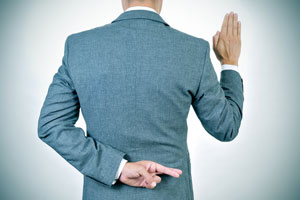A recent decision of the U.S. Court of Appeals for the Federal Circuit concluded that expert witnesses testifying on both sides of a patent infringement dispute committed misconduct. The decision vacated the judgment and remanded the case for a new trial.
Expert Testimony at Trial
Rembrandt Vision Technologies sued Johnson & Johnson Vision Care, alleging that certain Johnson & Johnson contact lenses violated Rembrandt’s patent. At trial, Rembrandt called Dr. Thomas Beebe as an expert witness. Dr. Beebe supported his testimony with the results of tests he performed on the contact lenses.
In his direct testimony, Dr. Beebe described the testing methodology he used. He had also explained that methodology in his expert report. On cross-examination, however, Dr. Beebe changed his testimony and described a “drastically different” testing methodology. Because that methodology was not disclosed in Dr. Beebe’s expert report, the court struck Dr. Beebe’s testimony.
In its defense, Johnson & Johnson relied upon the expert testimony of Dr. Christopher Bielawski. Dr. Bielawski challenged not just the opinions but also the credibility of Dr. Beebe. For example, Dr. Bielawski testified that Dr. Beebe’s failure to correct mistakes in his data was “misleading and tantamount to dishonesty.”
The jury found in favor of Johnson & Johnson. The trial court also granted judgment for Johnson & Johnson as a matter of law, after finding that Rembrandt had insufficient evidence to support its claim without Dr. Beebe’s testimony.
Motion for New Trial
After the trial, Rembrandt discovered that Dr. Bielawski had testified falsely. He claimed during his testimony that he personally tested the contact lenses when, in fact, his graduate students and lab supervisors conducted the testing while he was out of the country. He also represented himself as an expert in a certain testing methodology (time-of-flight secondary ion mass spectrometry) when, in fact, he had no experience with that methodology whatsoever.
In addition, Dr. Bielawski withheld test results and data analysis that would have undermined his opinions and trial testimony. Johnson & Johnson contended that it was unaware that Dr. Bielawski concealed the results of tests that were unfavorable to its position.
Rembrandt moved for a new trial on the ground that the verdict was procured by fraud and that newly discovered evidence revealed Dr. Bielawski’s deceptive conduct. The district court denied the motion on the ground that Rembrandt failed to show that Dr. Bielawski’s false testimony affected the result of the trial.
Court of Appeals’ Decision
On several occasions during the trial, Dr. Bielawski impugned the credibility of Dr. Beebe. Rembrandt was denied the same opportunity to challenge the credibility of Dr. Bielawski because it did not know that he testified falsely and withheld critical documents. Dr. Bielawski’s misconduct was at least as serious as Dr. Beebe’s. The court of appeals therefore had little difficulty concluding that Dr. Bielawski’s misconduct deprived Rembrandt of a full and fair opportunity to present its case.
The court of appeals concluded that Rembrandt was not required to prove that Dr. Bielawski’s misconduct affected the verdict. While the district court struck Dr. Beebe’s testimony, leaving it with little proof of a central part of its claim, the case might have proceeded differently if Dr. Bielawski had not withheld critical documents during discovery. Learning of the weakness in Johnson & Johnson’s defense could have changed the way Rembrandt approached its proof of the case.
When fraud is committed during a trial, the fundamental question is whether the judgment was fairly obtained, not whether it was factually correct. The court of appeals did not attempt to determine how the case would have proceeded if Dr. Bielawski had obeyed the rules because that analysis would depend largely on speculation. Instead, it asked whether the trial was fair to Rembrandt. The court concluded that it was not.
Johnson & Johnson nevertheless argued that it should not be held responsible for its expert’s misconduct because it had no knowledge that the expert withheld information or testified falsely. The court of appeals expressed skepticism regarding that claim since the withheld results concerned tests that Johnson & Johnson asked Dr. Bielawski to perform. It nevertheless decided that Johnson & Johnson’s knowledge of the fraud did not matter because regardless of Johnson & Johnson’s complicity, the expert’s fraudulent conduct tainted the trial. Perjury and fraud undermine the integrity of a trial whether or not a party suborns the perjury or encourages the fraud.
Lessons for Experts and Lawyers
The lesson to be learned, for experts and lawyers alike, is the importance of telling the truth. Experts should turn over all test results to the lawyers who hire them, even if they are unfavorable. Experts should not “puff” their qualifications and they should not take credit for work they did not do. Nor should they decide during their testimony that they relied upon a previously undisclosed methodology.
Lawyers, in turn, should make sure that their experts understand their obligations. Lawyers should expressly ask experts for all test results and data that pertains to the case, even if the experts have chosen not to rely on that data. Lawyers should be sure to understand the methodology upon which an expert relied and should prepare the expert to be cross-examined. When lawyers and experts work together and follow the rules, the case is much less likely to be returned to the trial court for a second trial.




